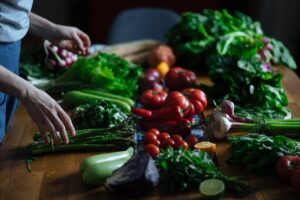Getting a proper night’s sleep is mandatory for staying healthy, yet so many of us still unknowingly sabotage our process with our messy eating schedules. Some foods could seem harmless on the outside, but they can have the biggest impact on your sleep quality, making it even more challenging to fall or even stay asleep.
Luckily, we got you covered. We discussed with nutritionists and managed to craft a list of the most common foods that can disrupt your sleep. Moreover, we also made a list with smarter choices that would support your sleeping schedule better.
So, before you go and reach for that late-night snack and sip your afternoon coffee, we invite you to rethink how your diet influences your night’s sleep. Here’s how to uncover which foods wreak havoc on your sleep, and what you can do about it!
Caffeine
Caffeine is quite an obvious sleep disruptor, but it can be found in many things other than coffee. In fact, anything with caffeine can easily act as a stimulant that blocks adenosine, which is a chemical that promotes sleep. This has the potential to make it much harder to fall asleep, delaying the overall timing of your internal clock and reducing your total sleep time.
According to a 2023 meta-analysis in Sleep Medicine Reviews, drinking caffeine could easily reduce total sleep time by 45 minutes, lowering sleep quality by seven percent. The study also found that caffeine adds nine minutes to how long it takes to fall asleep, and also adds 12 more minutes of wakefulness after initially falling asleep. Some people are simply more sensitive to caffeine, especially as they advance in age.
The best thing is to try to control your caffeine consumption as much as you can, meaning: minimum eight hours before bed, to make sure you’re not impacting your sleep quality. Keep track of hidden caffeine sources (like sodas, chocolate, energy drinks) throughout the day to help prevent unwanted interruptions in your own sleep schedule.
Sugary foods and drinks
Even if you crave something sweet after dinner, sugary snacks could only cause you more harm than good. Research has proven a direct connection between increased sugar consumption and poor sleep quality. There’s one study that proved how a high intake of sugary foods and drinks can be associated with shorter sleep duration.
Moreover, sugar can also trigger blood sugar fluctuations, especially during your sleep. Consuming way too many sweets can cause your blood sugar to spike in the middle of the night, especially if consumed close to bedtime.
This can also increase the overall likelihood of waking up during the night, because of these blood sugar fluctuations that could make you more alert, raising cortisol levels, and your “fight-or-flight” hormone that charges you into action.
Alcohol
It’s really no secret at this point that alcohol can make you feel sleepy. However, its effects on your sleep quality might tell a completely different story. Even if a glass of wine could help you relax, studies have shown that alcohol disrupts your sleep as soon as the initial sedative effects wear off. Even if alcohol could help you fall asleep faster, it can also lead to fragmented sleep.
A more recent interview published in Maturitas discovered that alcohol can drastically worsen sleep for women, in particular those going through perimenopause or menopause. As a renowned nutritionist has explained, “any level of alcohol consumption can increase night sweats and cause anxious thoughts, which can severely affect sleep quality.”
Spicy foods
Your late-night cravings for spicy food should be seen as a double-edged sword, since the Sleep Foundation explained how these foods can cause serious digestive issues that hinder your capacity to get restful sleep.
“Some people who have a hard time dealing with acid reflux find that spicy or acidic food, even if healthy at first, can disrupt sleep and increase symptoms,” Melissa Mitri, RD, registered dietitian, explained. Moreover, those living with irritable bowel syndrome (IBS) might have to avoid overly fibrous foods in the evening, since these foods can easily exacerbate digestive symptoms.
Fatty foods
Heavy and greasy foods are infamously bad for our digestive system. When you eat them before bed, they can cause you to feel very uncomfortable and restless throughout the night. Research even shows that foods high in fat, such as fried foods and fatty cuts of meat, take way longer to digest, which can cause bloating and discomfort when you lie down. In fact, eating a large fatty meal right before bedtime can drastically delay stomach emptying, keeping you from falling asleep naturally and easily.
Highly processed foods
Even if we often associate processed foods with weight gain and poor health, their impact on our sleep is another huge issue. According to a 2023 meta-analysis in Nutrition, high processed foods are laden with a ton of sugar, unhealthy fats, and artificial ingredients that can easily disturb your body’s natural sleep rhythms.
Energy bars and pre-workout snacks
Energy bars and pre-workout snacks are often seen as healthy options for a rapid energy boost, even if many of these foods have hidden sources of caffeine, sugar, as well as stimulants that can easily wreak havoc on your sleep.
The thing is that all the other hidden sources of caffeine, often found in chocolate or some types of energy bars, can easily disrupt your sleep without you even realizing they do so. Moreover, small amounts of caffeine and sugar, eaten quite late in the day, can make it so much harder to fall asleep and stay so, so it’s fairly important to track your intake and effectively establish which one of these impacts your sleep.
How to choose foods that support better sleep
If you have gotten tired of counting sheep, some foods can naturally enhance your sleep quality. In fact, some serotonin-rich foods such as kiwi, eggs, and turkey can definitely help you sleep better by effectively promoting serotonin production.
Moreover, studies have proven that foods rich in magnesium, such as almonds and leafy greens, can help calm your nervous system, preparing your body for rest. So next time evening cravings hit, just ditch the sugary, fatty foods, and go for a nutritious snack about one hour before bed. In fact, a handful of almonds and a small bowl of Greek yogurt can offer the right balance of nutrients to effectively support a restful night’s sleep.
How to build a sustainable bedtime routine with the right food in your mind and tummy
The first thing worth remembering is that consistency is the most important factor. Building a proper nighttime routine that also includes healthy eating habits can gradually improve both the quality and duration of your sleep.
Try keeping a food and sleep journal for a couple of weeks, and see if there are any patterns between what you eat and how well you rest. This kind of awareness can help you make intentional choices that fully align with your sleep goals.
Also, do your best to avoid eating big meals too close to bedtime. The best thing you can do is finish your last substantial meal at least 2 to 3 hours before sleep. If you’re hungry after that, go for a light snack rich in protein and complex carbs, like a banana with peanut butter or a slice of whole-grain toast with avocado.
If you found this article insightful, we also recommend checking: 10 Freezer Foods for Emergency Meals You Should Always Have on Hand







